
Oman, officially the Sultanate of Oman, is a country in West Asia. It is located on the southeastern coast of the Arabian Peninsula, and overlooks the mouth of the Persian Gulf. It shares land borders with Saudi Arabia, the United Arab Emirates, and Yemen, while sharing maritime borders with Iran and Pakistan. The capital and largest city is Muscat. Oman has a population of nearly 4.7 million and is the 124th most-populous country. The coast faces the Arabian Sea on the southeast, and the Gulf of Oman on the northeast. The Madha and Musandam exclaves are surrounded by United Arab Emirates on their land borders, with the Strait of Hormuz and the Gulf of Oman forming Musandam's coastal boundaries.
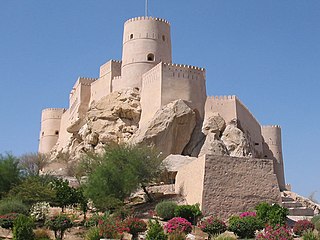
Oman is a site of pre-historic human habitation, stretching back over 100,000 years. The region was impacted by powerful invaders, including other Arab tribes, Portugal and Britain. Oman, at its height, held holdings that ranged from the Persian Gulf all the way south to the island of Madagascar, some notable holdings include; the island of Zanzibar, the city of Mogadishu and the city of Gwadar.

Said bin Taimur was the 13th Sultan of Muscat and Oman from 10 February 1932 until he was deposed on 23 July 1970 by his son Qaboos bin Said.
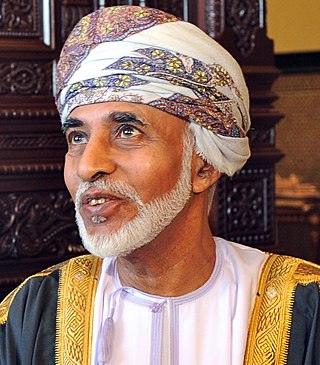
Qaboos bin Said Al Said was Sultan of Oman from 23 July 1970 until his death in 2020. A fifteenth-generation descendant of the founder of the House of Al Said, he was the longest-serving leader in the Middle East and Arab world at the time of his death, having ruled for almost half a century.

Salalah is the capital and largest city of the southern Omani governorate of Dhofar. At the 2020 census, it had a population of 331,949.
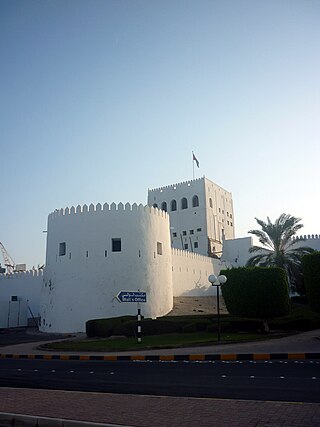
Sohar is the capital and largest city of the Al Batinah North Governorate in Oman. An ancient capital of the country that once served as an important Islamic port town on the Gulf of Oman, Sohar has also been credited as the mythical birthplace of Sinbad the Sailor. It was historically known as Mazūn (مَزُوْن).

Sultan Qaboos University is a public university located in al-Seeb, Oman. Established in 1986, it is one of the two public universities in the country and is named after Qaboos bin Said al-Said, the Sultan of Oman from 1970 until 2020.

This page list topics related to Oman.

Omanis are the nationals of Sultanate of Oman, located in the southeastern coast of the Arabian Peninsula. Omanis have inhabited the territory that is now Oman. In the eighteenth century, an alliance of traders and rulers transformed Muscat into the leading port of the Persian Gulf. Omani people are ethnically diverse; the Omani citizen population consists of many different ethnic groups. The majority of the population consists of Arabs, with many of these Arabs being Swahili language speakers and returnees from the Swahili Coast, particularly Zanzibar.
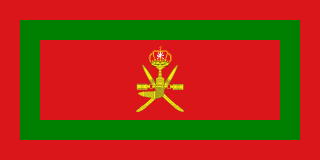
The House of Busaid, also known as the House of Al Said, is the current ruling royal family of Oman, and former ruling house of the Omani Empire (1744–1856), Sultanate of Muscat and Oman (1856–1970) and the Sultanate of Zanzibar (1856–1964). It was founded by Ahmad bin Said Al Busaidi in 1744 and is currently headed by Haitham bin Tariq Al Said.

The WHO Regional Office for the Eastern Mediterranean is the regional office of the World Health Organization that serves 22 countries and territories in West Asia, North Africa, the Horn of Africa and Central Asia. It is one of the WHO's six regional offices around the world.

The National & Gulf Center for Evidence Based Health Practice has been established with the initiative of Bandar Al Knawy, Chief Executive Officer of National Guard Health Affairs, and with the support of former chief executive, Abdullah bin Abdulaziz Al Rabiah in March 2004. The center is recognized by the Cooperation Council for the Arab States of the Gulf Ministers of Health as a reference to evidence-based medicine (EBM) in Saudi Arabia and the Cooperation Council for the Arab States of the Gulf (GCC). The center is an affiliated center to Evidence Based Clinical Practice Group in McMaster University, Canada. This group is led by Gordon Guyatt. It is also a collaborating centre to The Joanna Briggs Institute for Evidence Based Health care, in the University of Adelaide, Australia. The center works in contact, coordination and collaboration with the National EBM committee, GCC Ministers of Health Executive Office, Arabian Gulf University EBM Center, Bahrain, University of Sharjah EBM center, United Arab Emirates, and Sultan Qaboos University EBM Center, Oman.
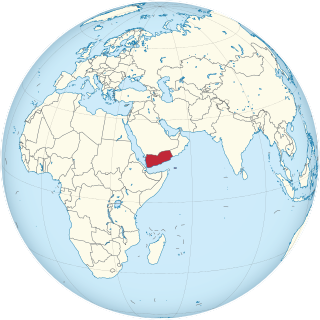
An outbreak of cholera began in Yemen in October 2016. The outbreak peaked in 2017 with over 2,000 reported deaths in that year alone. In 2017 and 2019, war-torn Yemen accounted for 84% and 93% of all cholera cases in the world, with children constituting the majority of reported cases. As of November 2021, there have been more than 2.5 million cases reported, and more than 4,000 people have died in the Yemen cholera outbreak, which the United Nations deemed the worst humanitarian crisis in the world at that time. However, the outbreak has substantially decreased by 2021, with a successful vaccination program implemented and only 5,676 suspected cases with two deaths reported between January 1 and March 6 of 2021.

Al-Makassed Islamic Charitable Society Hospital is a Muslim Community founded teaching hospital and charitable hospital of the Palestinian Arab’s charitable founded by Makassed Islamic Charitable Society, There is one of district general hospital from part of six hospitals in the East Jerusalem Hospitals Network. It has 250 beds and is situated on Mount of Olives in East Jerusalem. It serves as a tertiary referral hospital mainly for the Arab population of the Palestinian territories, namely the West Bank and the Gaza Strip, but also provides health care for the Israeli population when they meet obstacles using other facilities. It is a teaching hospital of Al-Quds University Faculty of Medicine.

Ahmed Faraj Abdullah Al-Rawahi, commonly known as Ahmed Al-Rawahi, is an Omani footballer who plays for Al-Seeb in the Oman Professional League.

Akjemal Magtymova is a Turkmen physician, working in the field of public health and development as an international civil servant with the United Nations.
Zafar Mirza is a Pakistani politician who served as a special assistant to the Prime Minister for Health. He was appointed by Prime Minister Imran Khan on 23 April 2019.

Hilal bin Ali bin Hilal Al-Sabti was born on October 27, 1972. On June 16, 2022, His Majesty Sultan Haitham Bin Tariq has issued a Royal Decree appointing Dr. Hilal bin Ali bin Hilal Al Sabti, as the new Minister of Health. He succeeded His Excellency Dr. Ahmed Al Saidi on this new role.
Ahmed Sulaiman Al-Harrasi is an Omani scientist and a professor of organic chemistry at the University of Nizwa, Nizwa, Sultanate of Oman.















